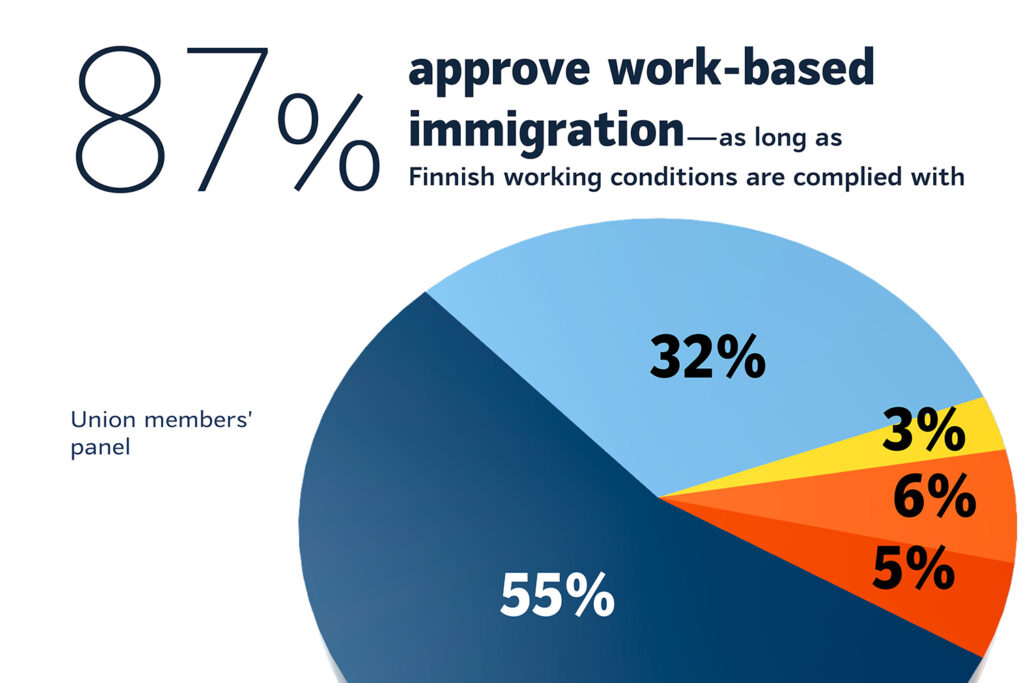Working Against Exploitation – “A Union Member Never Has to Fight Alone”
The rampant exploitation of foreign workers in Finland has reached national headlines. The Industrial Union can prevent exploitation when employees are union members and share their experiences.
The exploitation of foreign workers at Finnish workplaces has made headlines. On 27 September, STT reported exploitation, such as excessively long workdays and unpaid wage supplements, committed by subcontracting companies at the Turku shipyard.
A book by reporter Paavo Teittinen, Pitkä vuoro – kuinka moderni orjuus juurtui Suomeen (”The Long Shift – How Modern Slavery Took Root in Finland”), was published on 29 September. In it, Teittinen writes about a widespread culture of exploitation and gives numerous examples.
Riikka Vasama, the head of the Industrial Union’s Foreign Labour Unit, says that the union’s message is clear: exploitation of any kind is unacceptable, and work is constantly being done to combat the phenomenon.
– We struggle with issues like these every day. Even though our workdays are already filled with cases, we feel that we’re only seeing the tip of the iceberg, Vasama says.
Exploitation beneath the surface can be addressed when workers with a foreign background join the Industrial Union, speak about their experiences and trust the union’s help.
– Be brave and join the union. A union member never has to fight alone. The Industrial Union is a strong actor through which members encountering problems in working life can get their voices heard.
Even though our workdays are already filled with cases, we feel that we’re only seeing the tip of the iceberg.
Vasama underlines that all communication with the union is confidential. Issues are only acted on with the member’s permission.
– We recommend reporting any observations to us so that we can assist the authorities in preventing labour exploitation and influence the development of legislation. Change is possible.
SUPPORT AND LEGAL AID
A member of the Industrial Union gains access to all the union’s services. The union’s assistance ranges from simple advice on work-related questions to, in extreme cases, long legal battles in the courts.
Primarily, legal aid may be granted to those, who have been union members for at least 3 months before the events that have led to the legal issue. If legal aid is granted, the union will cover all costs of the legal process. This means that there is no monetary risk for the member, and the member receives any possible compensation awarded by the court in full.
– It’s a good idea to join the union well ahead of time and not when the problem is already at hand, Vasama says.
In problems related to employment relationships, a worker with a foreign background may contact the Occupational Safety and Health Administration, the Finnish Immigration Service and the police. For those unfamiliar with the Finnish system, finding the correct authority can be difficult.
– All of this can be taken care of together with the union, once you’re a member.
The authorities cannot help with all work-related problems.
– For example, the Occupational Safety and Health Administration will not demand unpaid wages from the employer. Non-members have a lower level of legal protection.

LEGISLATION TOO LENIENT
Decision-makers and authorities have a lot to do in order to make the Finnish labour market fairer than it is now. Sanctions for breaking the law and other rules should be harsher, and more resources should be allocated to monitoring.
– Tougher laws on labour market crime are absolutely needed. The current legislation is much too lenient on these issues, Vasama says.
One weakness of the law concerns wages. In Finland, it is not a punishable offence to leave wages unpaid. It is possible to demand payment through the courts, but there are no sanctions for the employer if their actions do not meet the legal characteristics of usury, for example.
– Throughout the years, I have come across decision-makers and employers downplaying the phenomenon, Vasama says.
Everybody needs to recognize that this is a widespread phenomenon, and that action needs to be taken.
The number of publicized instances makes it clear that labour exploitation is no longer a matter of rare, isolated cases.
– Everybody needs to recognize that this is a widespread phenomenon, and that action needs to be taken.
There have been some improvements to the legislation in recent years. A victim of exploitation or major neglect by the employer may now apply for an extended residence permit that allows working in any field of work. Previously, a victim of exploitation ran the risk of ending up with nothing when reporting abuse, as the employment relationship, on which their residence permit was based, came to an end.
– It is fortunate that legislative changes such as this have been made in recent years. However, residence permits of this type are not applied for very often, Vasama says.
THE PHENOMENON AFFECTS EVERYONE
Labor exploitation affects virtually all sectors of the economy. There have been visible problems on shipyards and in the forestry, agriculture, horticulture, forest berry picking and construction sectors, among others.
– The risk factors vary between sectors. For example, in shipbuilding and forestry, long subcontracting chains constitute a risk. It is important to strengthen the obligations and liabilities of the main contractor, Vasama says.
The story of Ukrainians fleeing the war and ending up exploited in the Finnish labour market is a dark one. However, labour exploitation is an older phenomenon and not limited to certain nationalities. Trampling on the employment conditions of workers with a foreign background makes the situation of everybody working in Finland worse.
– Exploitation concerns all nationalities. The risk if greater when workers lack language skills or knowledge about Finnish working life.
Becoming an active member in the union provides a chance to influence the union’s activities, the labour market and society in general.
– The union educates its members. Through the union, you can become a conscious actor as well as network and make friends, Vasama says.




